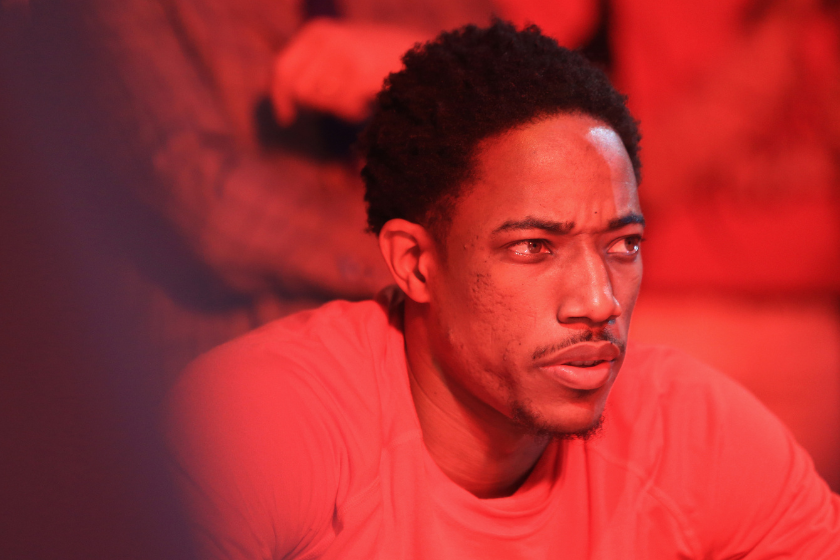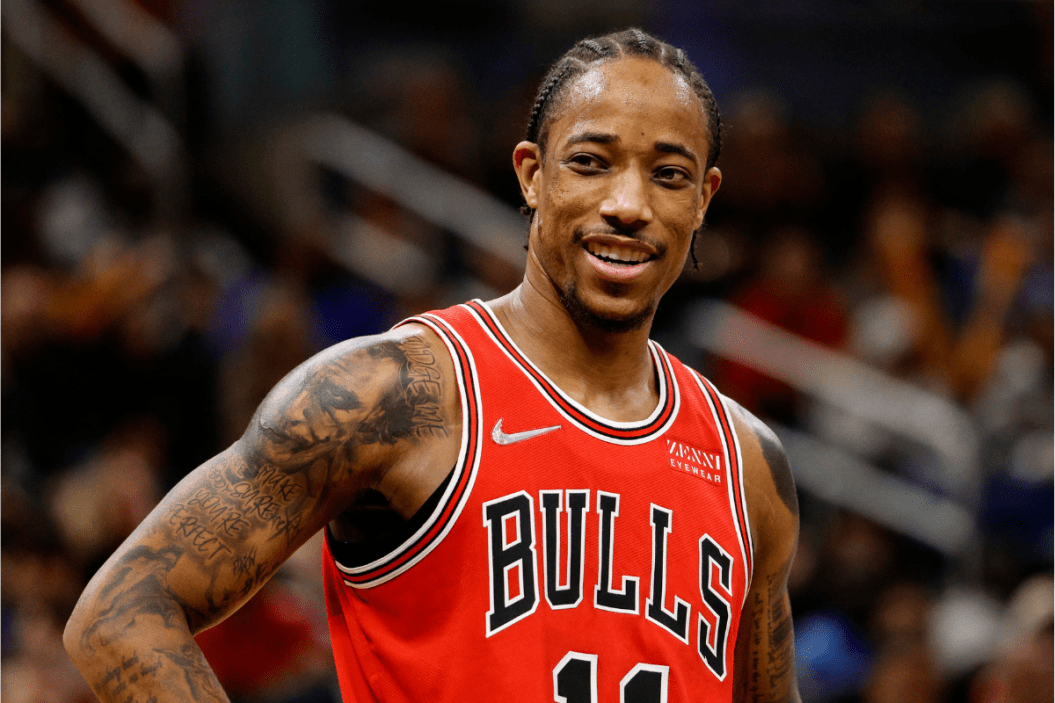Who's to say what makes a person happy? Is it money? Success? Family? Friends? These are commonly attributed to happiness on paper, but someone with all these things could be deeply saddened while someone with nothing could be the happiest person on the planet. Why?
Videos by FanBuzz
I have no idea. I have no idea why people feel they way they do. People are complicated. Understanding why people feel the way they do is how we uncomplicate.
Chicago Bulls star DeMar DeRozan learned a similar sentiment from his mother.
"Never make fun of anybody because you never know what another person is going through," she told him.
DeRozan divulged his struggle with depression in 2018. His admittance, along with former Cleveland Cavaliers and current Miami Heat forward Kevin Love revealing his own mental health issues of panic attacks, anxiety and depression, further opened the conversation about the stigma surrounding mental health. When talking about statistics, this may be one of the best assists in NBA history.
DeMar DeRozan's Mental Health Story
RELATED: Kevin Love's Panic Attack Inspired Him to Help Destigmatize Mental Health
NBA All-Star Weekend 2018 was a big moment for DeRozan. He earned his fourth All-Star appearance by averaging 23 points per game for the East-leading Toronto Raptors, but this year's annual event was extra special because it was held in his hometown of Los Angeles, California. DeRozan was ecstatic for the homecoming of course, but going home can be a mixed bag, and it's one you don't see next to dunks on ESPN.
One one hand, then four-time All-Star was ecstatic to see his daughters. On the other, it meant old connections wanted a piece of him in one way or another.
"I remember getting home and as soon as I touch down everybody and their momma just pulling at me, pulling at me," he said on the All The Smoke podcast hosted by Matt Barnes and Stephen Jackson.
"Needing something, wanting something, got something to say, this, that. It's like 'I just wanna see my kids, man.' It put a different type of pressure on me, and I think I just had a buildup of being fatigued from the season, people just on my head, and just the overwhelming [feeling] of everything going on."
All this prompted him to write the now famous tweet.
This depression get the best of me...
— DeMar DeRozan (@DeMar_DeRozan) February 17, 2018
"I remember laying down in the middle of the night at 3 in the morning like "Man, I got nobody to talk to, man. F—- it, I'll go to Twitter,'" he continued.
"I tweeted. Man, I lay down, not knowing the next day we have media, not knowing the whole media is going to be asking me questions about this tweet. I remember waking up and everybody's calling me like 'Man, do you know what you just tweeted? Whatchu mean? This and that.' It was so much stuff to where it's like 'Damn.' And it just put me in place where I like 'F—- it. I've been through so much in my life that I'm about to express it and say what's on my mind because I've been internalizing so much stuff that I had never even addressed growing up in Compton from high school of things that I had seen and witnessed and been through.'"

Photo by Vaughn Ridley/Getty Images
The social media post was met with widespread support, mainly praising DeRozan's vulnerability. Suddenly, he was made a mental health advocate overnight. However, the shooting guard is not one to be an outspoken. No, he's known for his being quiet and reserved, which he says could be attributed to his environment growing up.
"I always have various nights," DeRozan told Toronto Star reporter Doug Smith. "I've always been like that since I was young, but I think that's where my demeanor comes from. I'm so quiet, if you don't know me. I stay standoffish in a sense, in my own personal space, to be able to cope with whatever it is you've got to cope with."
DeRozan and Barnes, who grew up Santa Clara, California, both said that showing emotion was a sign of weakness growing up. Toughing it out was the standard.
How DeMar DeRozan is Helping Destigmatize Mental Health & Wellness
The result of DeRozan opening up shined a light on mental health not only in sports, but for everyone. Kevin Love penned an emotional essay in The Players' Tribune called "Everyone Is Going Through Something" a month after DeRozan's initial tweet. And together, the two became the NBA's faces of mental health.
The two starred in a PSA during the 2018 NBA Playoffs to encourage people to ask for help. They also opened up about their mental health challenges at the Aspen Ideas Festival in 2019 with the goal of ending the stigma surrounding anxiety and depression, especially among men.
Both NBA players have taken significant measures to raise mental health awareness since. Love started the Kevin Love Fund while DeRozan starred in the Apple TV+ Series "The Me You Can't See" which focuses on the importance of mental health and well-being. He was also the keynote speaker for the 2020 espnW + Sports Summit in the thick of the coronavirus pandemic and during his time with the San Antonio Spurs, he spoke to local students about ways to seek help, too. Their efforts also prompted the NBA to require at least one full-time mental health professional on their staff.
"This is real stuff," he told the Toronto Star. "We're all human at the end of the day. That's why I look at every person I encounter the same way. I don't care who you are. You can be the smallest person off the street or you could be the biggest person in the world, I'm going to treat everybody the same, with respect."
Everyone is human, and humans, whether they be a professional athlete or a mailman, can be going through something no matter their circumstances. He has, and he's more than willing to help others.
